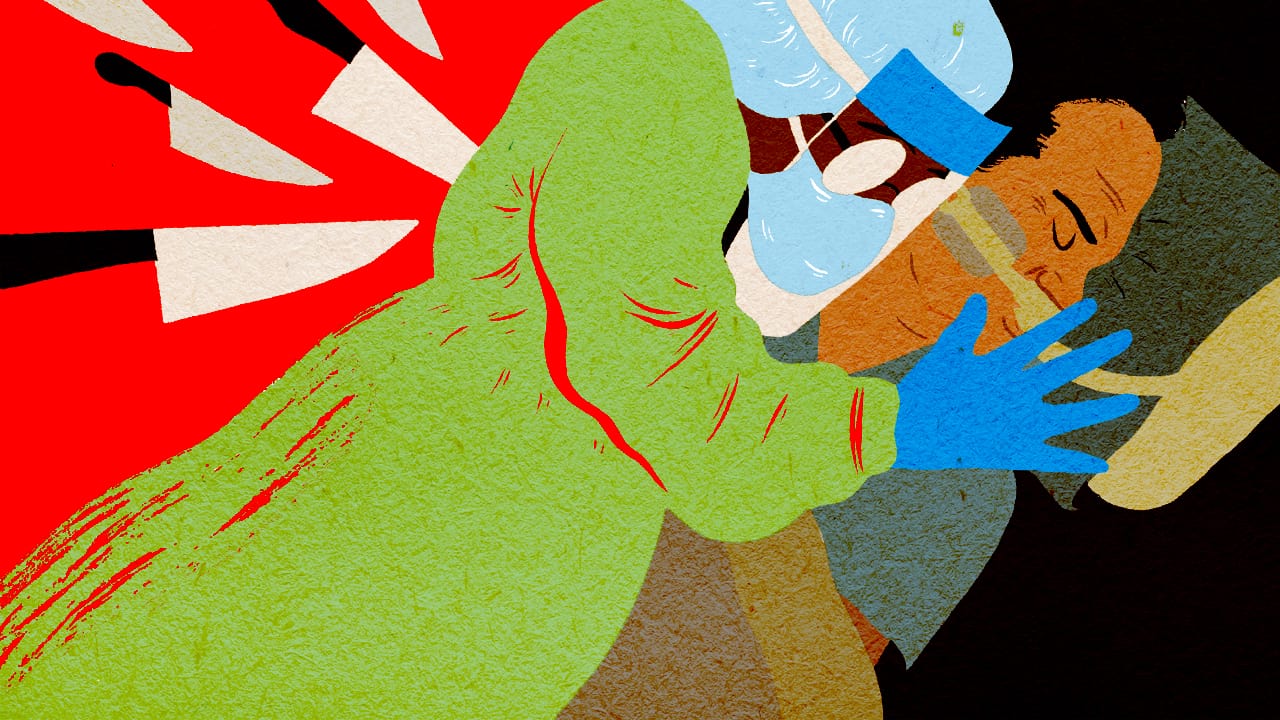For two years, nurses have been on the frontlines of this pandemic—overworked, undervalued, and underpaid. COVID-19 has exacerbated what was already a stressful situation. Burnout doesn’t capture the trauma they’ve experienced, and now poor working conditions are driving many to exit the industry altogether.
Over the next five weeks, we will share stories from Ontario nurses—as told in their own words—to gain a better understanding of what life is like in our hospitals right now.
Faiza Tahalil has worked as an ICU nurse in Peel Region for 10 years, and before that, she was an emergency cardiology nurse for a decade.
Faiza’s story, as told to Alex Mlynek.
I love my job.
I went into this job because many moons ago, my younger sister, who had lupus who passed away, was the eyeopener to the service that I could provide to this world. So nursing is not a job for me, it is a lifelong change of humanity. It’s my passion. There’s nothing more gratifying in this world than helping another human being, especially in their worst, most vulnerable moments.
But during the pandemic, nursing is not a job — it’s a war. It’s a constant battle every single day; a battle of not only taking care of very sick individuals, but also a battle of seeing what our leaders have done to us.
An example of the war that we’re in and how we’re constantly being belittled and abused: In the midst of this pandemic, our institution and our government has decided to cut back my benefits. I work 12 hours a day. I change your loved one every two hours and turn them to prevent bed sores, regardless of the fact that they’re infected. I go in that room and I am not even able to go and see a physiotherapist for any of the damage that has happened to my body? But yet the administration still has their benefits. The government has given their cabinet a raise. I have not been given a raise and yet I am the one that is holding your loved one’s hand as they pass away. I am the one that is turning your loved ones and potentially exposing myself to this virus every single day.
People wonder why nurses are leaving. I can tell you why: There’s no transparency or gratification in our jobs anymore. We’re short-staffed constantly. It is absolute mayhem going to work every single day. The anxiety just going in, thinking, how many nurses are going to be there to hold the fort today is my prayer every single day. How do I take care of your patient? How do I truly take care? There’s nothing more important to me than being able to give full care to my patient. Especially complicated, sick, ventilated individuals who are very vulnerable. Yet we have money to spend on new buildings? We are unable to staff the hospitals that we have right now! A bed is a bed without a nurse. That’s the reality.
When you’re running a 28-bed ICU unit and you only have 13 nurses, you have fully vented patients, and you have only two respiratory therapists running the unit, what does that tell you? It should typically be one patient to one nurse. These patients are very sick. They’re very vulnerable. They’re fighting for their lives. They’re prone— meaning that they’re on their chest. You need three, four people to turn them. How do you do that with two patients physically, consistently? And it’s not just the workload. It’s the science behind it of making sure that every single time I look at that monitor, is their heart rate the same? You’re doing that every single hour because they’re so frail. How do you perform your job to the best? How do you call yourself a nurse?
Now the new mandate is, regardless of if you have COVID or not, as long as you’re asymptomatic, you need to come back to work. Because that’s how dire of a situation we are in. This forces nurses who don’t have COVID to be working close by to those that do. This is an ICU. It is really hard to have this magical six feet apart that everybody keeps talking about. When I’m turning my patient, we are right next to each other. So I am exposed now to not only the patient’s COVID, but my coworkers’ COVID. I’m vulnerable.
If I get COVID and I get sick, it’s occupational health calling and interrogating me on when I’m coming back. And I get it, we are desperate. What is the solution? You exposed me to COVID, you allowed an individual who had COVID to be near me. And now I’m at fault. That’s how it feels; like I’ve done a bad thing. But the system is broken, and nobody wants to take responsibility.
Our healthcare has imploded. We can no longer sustain this. We cannot. There are not enough nurses or doctors to facilitate the care that our community needs. And we need to invest in that ASAP. We don’t need to invest in buildings. We need to invest in our people to take care of our people.
I’m so upset and so angry. I’m so tired of this. It’s bigger than COVID. How our society looks at our healthcare should change. It is the most important asset that we have. We will all age. We’re in a time and age where things are going so fast and our bodies are unable to keep up. And if we don’t invest in our healthcare system we won’t be here for long, that’s for sure.
How can the public support nurses? Lobby to our government. We need more nurses, we need more pay. We need to be apologized to and we need to be compensated for the work that we do.
This interview has been edited and condensed for length and clarity.




 Follow Us On Instagram
Follow Us On Instagram
